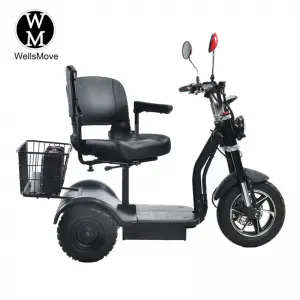How to Choose a Mobility Scooter Supplier
Introduction
In the global market, mobility scooters have become essential tools for seniors, individuals with limited mobility, and rehabilitation patients. As a global wholesale buyer, choosing the right mobility scooter supplier is crucial for ensuring the quality, safety, and reliability of the products you offer.
Understanding the Market
Market Demand and Trends
The demand for mobility scooters is on the rise, driven by an aging population and an increasing need for efficient, compact, and travel-friendly solutions. Global buyers should be aware of the latest trends, such as the growing popularity of folding mobility scooters, which are easier to transport and store.
Key Demographics
To choose the right supplier, you must first analyze your market’s key demographics, such as age, lifestyle, and typical use cases. Understanding these factors will help you determine the specific features and types of mobility scooters that will appeal to your customers.
Evaluating Supplier Criteria
Quality Certifications
Quality certifications are a critical factor in choosing a reliable supplier. Ensure that the supplier’s products comply with international standards such as ISO, CE, and FDA. Additionally, lithium battery safety certifications like UN38.3 and MSDS are essential for ensuring the safety of the scooters.
Manufacturing Capacity and Reliability
When sourcing mobility scooters in bulk, it is essential to verify the supplier’s manufacturing capacity and reliability. Look for suppliers with a proven track record of consistent production and delivery. A reliable supplier should also have the ability to handle large orders without compromising on quality.
Product Range and Customization
A good supplier should offer a wide range of mobility scooters to cater to different customer needs. This includes various types such as Class 2 scooters for indoor use and Class 3 scooters for outdoor use. Additionally, customization options for OEM/ODM partners are a significant advantage. This allows you to tailor the scooters to meet specific market demands and preferences.
After-Sales Support
After-sales support is crucial for customer satisfaction. Look for suppliers who offer comprehensive after-sales services, including maintenance tips, warranty, and repair services. A reliable supplier should also provide spare parts availability to ensure the long-term usability of the scooters.
Pricing and MOQ
Wholesale buyers need to consider the cost benefits of bulk buying and the minimum order quantities (MOQ) required by suppliers. While lower prices may be attractive, it is essential to balance cost with quality and reliability. A reputable supplier may have higher MOQ requirements, but this can often lead to better quality products and more stable supply chains.
Regulatory Compliance
Different countries have different regulations regarding mobility scooters. To avoid legal issues, ensure that the scooters comply with the regulations in your target market. Compliance with standards set by entities like Public NJ Courts ensures smooth distribution and operation without regulatory hurdles.
Practical Tips for Global Buyers
Research and Due Diligence
Conduct thorough research on potential suppliers. Look for reviews, testimonials, and case studies from other buyers. This will give you an idea of the supplier’s reputation and reliability. Additionally, consider visiting the supplier’s manufacturing facilities if possible. This will allow you to assess their production processes and quality control measures firsthand.
Request for Samples
Before placing a large order, request samples from the supplier. This will enable you to evaluate the quality and functionality of the scooters. Pay attention to details such as build quality, comfort, and ease of use. Testing the samples will also help you identify any potential issues before committing to a bulk purchase.
Negotiation and Contract Terms
When negotiating with suppliers, be clear about your requirements and expectations. Ensure that the contract terms cover aspects such as delivery schedules, quality assurance, and after-sales support. It is also important to agree on clear terms for handling any potential issues or disputes.
Building Long-Term Relationships
Building a long-term relationship with a reliable supplier is beneficial for both parties. A good supplier will be more willing to work with you on customization, pricing, and other aspects if they see you as a long-term partner. Regular communication and feedback can help strengthen this relationship and ensure a smooth supply chain.
Post time: Jul-28-2025



